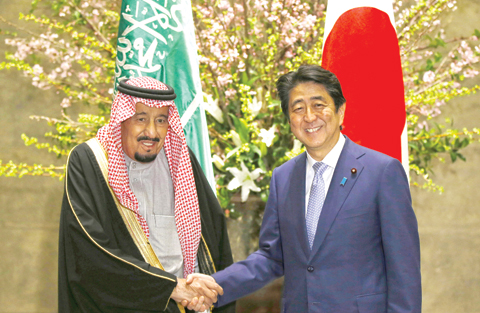Saudi deputy crown prince to meet Trump
 TOKYO: Saudi King Salman and Japan's Prime Minister Shinzo Abe shake hands before their meeting at Abe's official residence yesterday. - AP
TOKYO: Saudi King Salman and Japan's Prime Minister Shinzo Abe shake hands before their meeting at Abe's official residence yesterday. - APTOKYO: Japan and Saudi Arabia agreed yesterday to explore ways to bolster Japanese investment and trade in the Middle Eastern nation, possibly by setting up special economic zones there. King Salman and about a thousand businesspeople from Saudi Arabia are in Japan for talks this week focusing on the economy, as the country seeks a less oil-dependent growth strategy. Japanese Prime Minister Shinzo Abe told King Salman that Japan wants to "vigorously advance its ties with Saudi Arabia, which is the linchpin of stability in the Middle East". The visit is the first by a Saudi king in 46 years, though Salman visited more recently as crown prince.
The two leaders agreed to promote Japanese investment, research and manufacturing, possibly through special economic zones. They also agreed to seek a possible share listing of Saudi Aramco, the state-run oil company that is being partially privatized, on the Tokyo Stock Exchange. The two countries also will cooperate in promoting renewable energy as well as seawater desalination by Japanese companies. King Salman met with Japanese Foreign Minister Fumio Kishida earlier yesterday.
Separately, Saudi Arabia's sovereign wealth fund and Japanese telecoms provider Softbank have joined forces in setting up a $25 billion private fund for technology investments. Saudi Arabia is one of Japan's biggest suppliers of crude oil, accounting for about a third of its imports of oil from the Middle East. Trade between the countries fell last year as oil prices dropped. Japanese imports from Saudi Arabia totaled 2.1 trillion yen ($18.6 billion) in 2016, mostly oil and gas, compared to exports of 546.3 billion yen ($4.8 billion).
The two countries yesterday also signed economic cooperation agreements in industry, energy and finance. They also agreed to start a feasibility study on vehicle production in the Middle Eastern country. The Nikkei on Saturday reported that Toyota Motor Corp is looking into building a plant in Saudi Arabia. Japan's Deputy Chief Cabinet Secretary Kotaro Nogami told reporters Abe made the request for support on the Aramco listing to the Saudi monarch, who responded by saying the kingdom would look into the request because he wants Japanese investors to buy Aramco shares.
The Saudi delegation arrived late Sunday on about 10 aircraft. King Salman is on a month-long tour of Asia to advance his kingdom's economic and business interests. His stop in Japan followed visits to Indonesia and Malaysia. He is to travel on to Brunei, China and the Maldives. Salman pledged $1 billion in development finance for Indonesia and closer cooperation in combating transnational crime such as human trafficking, terrorism and the drug trade.
Separately, the White House confirmed yesterday that US President Donald Trump will meet this week with Saudi Arabia's second-in-line to the throne in the highest-level visit to Washington by a Saudi royal since November's presidential election. In his daily press briefing, White House press secretary Sean Spicer said the meeting with Deputy Crown Prince Mohammed bin Salman, who is also defense minister and King Salman's son, will take place Thursday at the White House. No other details were provided.
The Saudi royal court, in a statement carried by the official Saudi Press Agency earlier yesterday, said that Prince Mohammed will meet with Trump and a number of US officials to discuss "the strengthening of bilateral relations between the two countries and regional issues of mutual interest". The prince, who departed for Washington yesterday, is spearheading the kingdom's economic overhaul to become less dependent on oil and its major investments in US technology firms.
He will be the first Gulf Arab royal to meet the president since his inauguration. Key issues at the top of the agenda are likely to include global energy prices, as well as the conflicts in Syria, Iraq, Libya and Yemen, where a Saudi-led coalition backed by Washington has been bombing Iran-backed rebels for nearly two years. Saudi Arabia, the world's top oil exporter and biggest buyer of American-made arms, is also part of the US-led coalition bombing campaign against the Islamic State group in Syria.
Saudi relations with Washington cooled under President Barack Obama after his administration secured a nuclear deal with regional rival Iran. The deal has been heavily criticized by Trump. Obama had also openly criticized Gulf Arab countries, expressing frustration at their feud with Iran. In contrast, the kingdom has expressed optimism about rebuilding its alliance with Washington and working with the Trump Administration to contain Iran's reach in the region. In a call between Trump and King Salman in January, the two agreed to back safe zones in Syria and Yemen, according to a White House statement. The monarch is currently touring Asia in a visit aimed at building alliances with other partners. - Agencies










